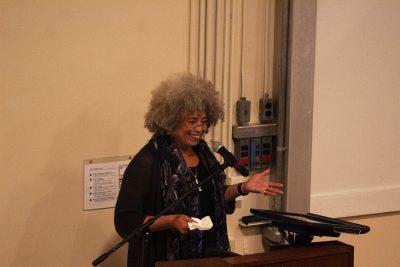
Boston University announced Thursday that due to space constraints, the university’s talk with Angela Davis on Saturday would only be open to BU students — and Boston residents who had gotten tickets well in advance would no longer be allowed to attend.
The announcement came two days before the much-anticipated talk was to be presented by BU’s Undergraduate Sociology Association at the Jacob Sleeper Auditorium, and left some Boston residents feeling excluded.
Monica Cannon-Grant, of Roxbury, was one of those who lost her ticket following the announcement. She tweeted Thursday that she was disappointed with BU for making the event public, only to later tell residents they could not attend.
https://twitter.com/ProRockThrower/status/1093558510909042688
Other BU students and Boston residents expressed their disapproval of how BU handled the situation on Facebook as well.
Cannon-Grant, a local activist and CEO of Violence in Boston, a non-profit dedicated to reducing violent crime in Boston, said that if space constraints were really an issue, BU should have realized this earlier and taken the appropriate measures.
“My frustration is even if that was the case, the event shouldn’t have been made public in the first place,” Cannon-Grant said. “They could have made the event private and only invited BU students and alumni, but they made it public, allowed outsiders to apply and get excited, and a lot of them were women of color who couldn’t afford to travel to see Dr. Davis elsewhere, and then there was no apology issued.”
Cannon-Grant said she purchased her ticket on Jan. 24 after hearing about the event from a fellow activist. She said she encouraged her friends and community members to get tickets as well, all of whom will no longer be able to attend.
“I’ve shared it with multiple other activists in the community, especially those who may not be able to financially pay to go see Dr. Davis at other locations,” Cannon-Grant said. “This would have been historic given the fact that it’s Black History Month. We’re all striving to do the work that she has paved the way for.”
Davis is a particularly important figure to Cannon-Grant, she said, and has inspired much of the work Cannon-Grant does for Boston including organizing a march in August 2017 following the violence in Charlottesville, Virginia.
Dean of Students Kenneth Elmore did not immediately respond to a request for comment, and the Undergraduate Sociology Association was unable to comment on the matter.
Kelsey Scarlett, a first-year student in the BU School of Law, said that she believes the talk should have been open to everyone.
“It should be open to those who want to be inspired,” Scarlett said. “While I understand prioritizing BU students and how that’s beneficial for the student community, I definitely can understand the local community being upset by no longer being able to attend this talk by an amazing woman.”
Molly Kopp, a sophomore in the College of Arts and Sciences, said that while she didn’t know much about the talk, she disagreed with the university’s decision.
“It sounds like [the Boston residents] should be allowed to go regardless of whether they are BU students,” Kopp said.



















































































































